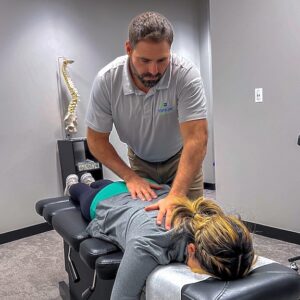In a world where back pain is all too common, the quest for relief often leads us down various paths. From painkillers to physical therapy, we’re constantly searching for that magic solution to alleviate our discomfort. But what if I told you that there’s a profession that specializes in treating spinal issues like degenerative disc disease without resorting to surgery or medication? That’s right, chiropractors are the unsung heroes in the battle against these debilitating conditions. In this blog, we will explore why chiropractors play a vital role in managing degenerative disc disease and how you can find a chiropractor near you to help you on your journey to a healthier, pain-free life.
Understanding Degenerative Disc Disease
Before we delve into the role of chiropractors, it’s essential to understand what degenerative disc disease (DDD) is. DDD is a condition in which the intervertebral discs in your spine start to break down, leading to pain, stiffness, and reduced mobility. These discs act as cushions between the vertebrae, and when they deteriorate, it can result in significant discomfort. DDD is often associated with the aging process, but it can affect people of all ages due to various factors like genetics, lifestyle, and injury.
Why Chiropractors?
Chiropractors are healthcare professionals who specialize in the diagnosis, treatment, and prevention of disorders related to the musculoskeletal system, particularly the spine. They utilize a hands-on, drug-free approach to relieve pain and improve the function of the body. So, why are they crucial in the management of degenerative disc disease?
1. Non-Invasive Treatment:
Chiropractic care offers a non-invasive approach to addressing degenerative disc disease. This is a crucial benefit for individuals who want to avoid the potential risks and recovery time associated with surgical procedures. Chiropractors use their hands, applying controlled force to specific areas of the spine, in a method known as spinal manipulation or adjustment. This manual technique is designed to restore proper alignment and alleviate pressure on the affected discs.
By doing so, chiropractors can help relieve pain and discomfort without the need for surgery or medication. This approach not only reduces the immediate symptoms but also fosters the body’s natural healing mechanisms. It’s an active and constructive way to manage the condition, putting the patient at the center of their recovery.
2. Pain Management:
Pain relief is one of the primary reasons people turn to chiropractors when dealing with degenerative disc disease. The pain associated with DDD can be debilitating and impact one’s quality of life. Chiropractors are skilled at pinpointing the source of the pain and applying specific adjustments to alleviate it. They focus on reducing inflammation and pressure on the affected discs, which can result in a significant reduction in pain levels.
Chiropractic care is not about merely masking pain with medication but about addressing its root causes. The active approach of spinal adjustments promotes long-term relief and a better quality of life for individuals dealing with DDD.
3. Improved Mobility:
Degenerative disc disease often leads to reduced mobility and flexibility, making everyday activities challenging. Chiropractors can help patients regain their range of motion by targeting the areas of the spine affected by DDD. Through adjustments and specialized exercises, they work to restore proper alignment and function, allowing patients to enjoy a more active lifestyle.
This improved mobility is not just about making daily tasks easier but also about preventing further complications. With better mobility, the risk of additional strain on the spine is reduced, contributing to the overall well-being of patients.
4. Preventive Care:
Chiropractors do not focus solely on symptom management but also on preventive care. They aim to address the root causes of the problem and develop personalized treatment plans that not only alleviate pain but also prevent its recurrence. By correcting misalignments and imbalances in the spine, chiropractors help patients maintain better spinal health.
Preventive care is a vital aspect of managing degenerative disc disease in the long term. It empowers individuals to take charge of their health and make proactive choices to minimize the impact of DDD on their lives.
5. Holistic Approach:
Chiropractors take a holistic approach to healthcare, recognizing that the body’s various systems are interconnected. They consider not only the physical aspects of the condition but also the patient’s overall health and lifestyle. This comprehensive approach includes addressing factors like diet, exercise, stress, and posture.
By taking these factors into account, chiropractors provide a well-rounded treatment plan that considers the patient as a whole. This approach can result in improved health and well-being beyond just managing the symptoms of DDD.
6. Patient Education:
Patient education is a significant component of chiropractic care. Chiropractors work to empower their patients with the knowledge and tools to take an active role in their own healing process. Understanding the causes of their condition and the importance of ongoing spinal health can be invaluable in managing DDD.
Chiropractors educate patients on exercises, lifestyle changes, and ergonomics to help them maintain a healthy spine. This not only aids in the management of DDD but also prevents its progression, ultimately improving the patient’s quality of life.
7. Customized Treatment Plans:
Chiropractors understand that every patient is unique, and so are their needs. When it comes to degenerative disc disease, the severity of the condition and the individual’s overall health can vary greatly. Chiropractors near me develop customized treatment plans tailored to each patient’s specific condition, taking into account their pain levels, age, lifestyle, and other factors.
This personalized approach ensures that patients receive care that is precisely suited to their needs, optimizing the chances of successful management and recovery.
8. Minimizing Medication Dependency:
Many individuals with degenerative disc disease resort to pain medication to manage their symptoms. While these medications can provide temporary relief, they often come with side effects and the risk of dependency. Chiropractic care offers a drug-free alternative for pain management.
By addressing the root causes of pain through spinal adjustments and other non-invasive techniques, chiropractors help patients reduce their reliance on pain medication. This not only minimizes potential side effects but also provides a more sustainable, long-term solution.
9. Collaboration with Healthcare Providers:
Chiropractors often work in collaboration with other healthcare providers, such as orthopedic specialists, physical therapists, and primary care physicians. This collaborative approach ensures that patients receive comprehensive care. For individuals with degenerative disc disease, this means a more well-rounded and effective treatment plan that combines various modalities to address their specific needs.
This teamwork between healthcare providers ensures that patients have access to a range of expertise, allowing them to make informed decisions about their health.
10. Patient-Centered Care:
Chiropractors are known for their patient-centered approach. They actively involve patients in their treatment plans, encouraging them to take an active role in their healing process. Patients are often provided with exercises and lifestyle recommendations that they can incorporate into their daily routines to improve their spinal health.
This patient-centered approach fosters a sense of responsibility and empowerment, as individuals become partners in their recovery. It also increases the likelihood of long-term success in managing degenerative disc disease.
How to Find a Chiropractor Near You
Now that you understand the vital role chiropractors play in managing degenerative disc disease, you might be wondering how to find a chiropractor near you. Here are some simple steps to guide you on your quest for relief:
1. Ask for Recommendations: Begin your search by asking for recommendations from your trusted circle of friends, family, coworkers, and even your primary care physician. Personal referrals can be highly valuable in your quest for a chiropractor. These referrals often come with specific details about the chiropractor’s expertise, approach, and overall patient experience, giving you firsthand insights into their quality of care.
2. Search Online: The internet is a powerful tool for finding healthcare providers, including chiropractors. Start by conducting an online search using keywords like “Chiropractor Near Me” or “Chiropractor in Libertyville.” This will generate a list of chiropractors practicing in your local area. Make sure to explore their websites and gather information about their services, credentials, and patient reviews.
3. Visit Chiropractic Association Websites: National and state chiropractic associations often maintain directories of licensed chiropractors. These directories can be a reliable resource for finding registered and reputable chiropractors in your vicinity. The American Chiropractic Association (ACA) and your state’s chiropractic board’s websites are great places to start your search.
4. Read Online Reviews: Online reviews on platforms like Google, Yelp, and Healthgrades can provide you with valuable insights into the experiences of previous patients. While reviews should not be the sole basis for your decision, they can offer a well-rounded perspective on a chiropractor’s approach to care, patient satisfaction, and any potential strengths or areas for improvement.
5. Check the Chiropractor’s Website: Many chiropractors maintain informative websites that detail their practice philosophy, services, areas of expertise, and approach to treatment. Browsing their websites can provide you with a more comprehensive understanding of their background and how they tailor their care to meet their patients’ needs. Look for any patient testimonials or success stories as well.
6. Verify Licensing and Credentials: It’s absolutely essential to confirm that any chiropractor you’re considering is properly licensed and certified in your state. You can often find information about a chiropractor’s credentials on their website, and you can also contact your state’s chiropractic board to verify their licensing status. Ensuring that they have the necessary qualifications is a critical step in your decision-making process.
7. Schedule a Consultation: Once you’ve narrowed down your list of potential chiropractors, it’s a good idea to schedule a consultation or an initial appointment with them. This face-to-face meeting allows you to meet the chiropractor in person, discuss your specific condition, and get a feel for their communication style, empathy, and professionalism. Pay attention to how well they listen to your concerns and answer your questions.
8. Discuss Treatment Plans: During the consultation, the chiropractor should discuss a comprehensive treatment plan that’s tailored to your unique needs. They should explain in detail the techniques they intend to use and provide information about the expected duration of the treatment. This is a crucial step as it allows you to assess whether their approach aligns with your health goals and expectations.
9. Ask About Costs: Clear communication about the financial aspects of chiropractic care is essential. While many insurance plans cover chiropractic services, the extent of coverage can vary. Ask about the cost of an initial consultation, follow-up visits, and any recommended therapies or treatments. Clarify what your insurance plan covers and what you may be responsible for out of pocket.
10. Trust Your Instincts: Ultimately, trust your instincts when choosing a chiropractor. Consider factors such as your comfort level with the chiropractor, your confidence in their expertise, and your commitment to your overall well-being. A positive and productive doctor-patient relationship is a vital component of successful chiropractic care and can greatly enhance your treatment experience.
In conclusion, if you’re dealing with degenerative disc disease or any other spine-related condition, consider adding a chiropractor to your healthcare team. Their ability to provide non-invasive pain relief, improve mobility, and promote overall well-being makes them a vital resource in your journey toward a healthier, pain-free life. So, take that step today, find a chiropractor near you, and embrace the benefits of chiropractic care.
Why Choose Us?
Experience the healing power of Evolve Chiropractic of Libertyville, your trusted source for exceptional chiropractic services in the Libertyville area. As the best chiropractor near you, we are passionate about enhancing the quality of life for our patients through non-invasive and drug-free methods. Our dedicated team specializes in a range of chiropractic techniques, from spinal adjustments to lifestyle counseling, all aimed at helping you attain your health and wellness goals. Whether you’re suffering from back pain, or neck discomfort, or want to maintain a healthy lifestyle, our experienced practitioners are here to guide you on your journey to vitality. Discover the difference Evolve Chiropractic can make in your life, and start your path to better health today.
Evolve Chiropractic of Libertyville
755 S Milwaukee Ave Ste 127, Libertyville, IL 60048
(847) 984-2965





